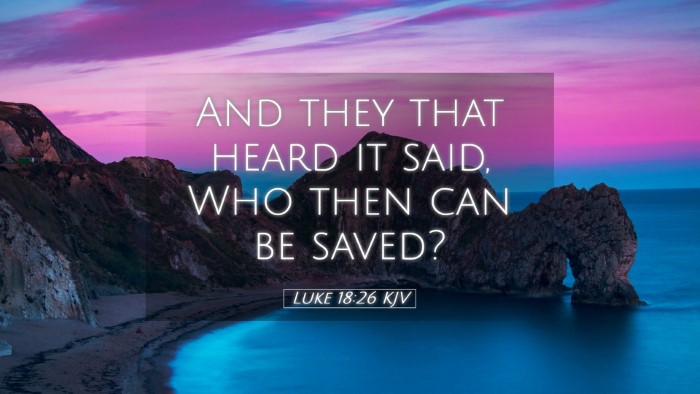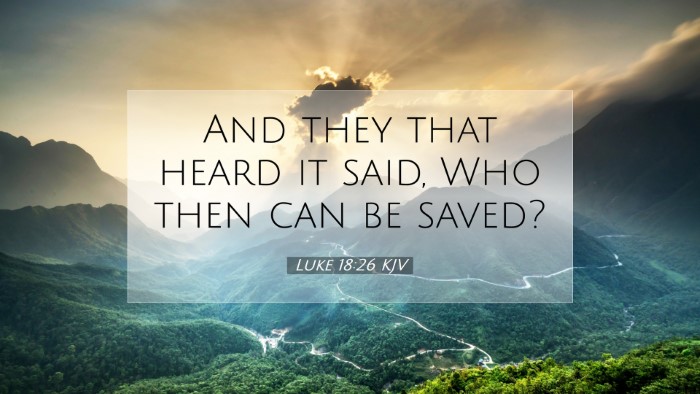Bible Commentary on Luke 18:26
Luke 18:26 reads: "And they that heard it said, Who then can be saved?" This verse emerges from the profound teachings of Jesus on the nature of wealth and salvation, illustrating the disbelief and confusion of His listeners in light of His radical assertions.
Contextual Analysis
The context of this verse is crucial. Prior to this, Jesus engages in a conversation with a rich ruler who seeks eternal life. The ruler claims to have kept the commandments since his youth. Jesus, in reply, challenges him to sell all that he has and distribute it to the poor, thereby exposing the man’s attachment to his wealth (Luke 18:22).
After the ruler leaves sorrowful, Jesus makes a profound statement regarding the difficulty of a rich person entering the Kingdom of God, likening it to a camel going through the eye of a needle (Luke 18:25). It is in response to this teaching that the crowd, bewildered by the implications for their own lives, asks, "Who then can be saved?"
Insights from Commentaries
Matthew Henry
Matthew Henry emphasizes the surprising nature of Jesus’ teaching. He notes that the reaction of the disciples and the people indicates a deep-seated belief that wealth was a sign of God’s favor. Therefore, if the rich could not be saved, what hope was there for the common person?
Henry points out that salvation is not based on human effort or social standing. His commentary brings forth the idea that the realization of the impossibility of salvation through human means is a critical step toward understanding divine grace. He underlines that "with God, all things are possible,” and that salvation is ultimately the work of God rather than human achievement.
Albert Barnes
Albert Barnes, in his analysis, provides a clear elucidation of the term “they that heard it.” He suggests that this included a variety of listeners: disciples, followers, and possibly onlookers who were impacted by Jesus' stringent remarks.
Barnes states that the people’s question reflects their concern about the accessibility of salvation, particularly for those who were affluent. He notes that this reaction reveals how ingrained societal beliefs about wealth's correlation to righteousness can lead to misunderstandings about grace. Barnes affirms that salvation is universally available, transcending social and economic status, a theme central to Jesus’ ministry.
Adam Clarke
Adam Clarke takes a historical perspective, providing context to the Jewish understanding of wealth in the first century. Clarke elucidates that wealth often equated to divine favor, thus making Jesus' statement radically countercultural. He explores how the listeners’ astonishment highlights the need for a dramatic shift in understanding salvation.
Furthermore, Clarke comments on the significance of their inquiry, asserting that it leads to an essential reflection on the nature of salvation itself. He emphasizes God's limitless power to save, reinforcing the affirmation that "What is impossible with man is possible with God.” Clarke’s insights draw attention to the miraculous nature of salvation, which is applicable to humanity, regardless of their state.
Theological Implications
This verse pushes the theological dialogue towards the nature of God’s grace versus human merit. The questions posed by the individuals involved encapsulate a broader hesitation regarding salvation's attainability.
- Divine Sovereignty: The conversation underscores God’s sovereignty in salvation. As highlighted by all three commentators, it is not through wealth or works that one achieves salvation, but rather through the grace of God alone.
- Human Condition: The inquiry poses an essential exploration of human incapacity to save oneself. This truth points toward the doctrine of total depravity, which asserts that humanity, in its natural state, lacks the capacity to choose God, hence necessitating divine intervention.
- Hope in Christ: The response of Jesus reassures believers of hope that transcends societal structures, enticing a relationship that rests on faith rather than material conditions.
Pastoral Applications
For pastors and church leaders, this passage provides vital insights for preaching and teaching about the perils of materialism and the importance of reliance on God’s mercy. It serves as a call to foster communities that prioritize spiritual wealth over material gains.
Additionally, this text encourages pastoral care for the wealthy, guiding them to understand the spiritual dangers of their status while also affirming God’s grace toward all. The tension created by the rich ruler's narrative and the ensuing discussion can be used in sermons to challenge congregants regarding their values and priorities.
Conclusion
Luke 18:26 encapsulates a critical moment of revelation in the Gospel narrative. Supported by historical and theological insights from public domain commentaries, it remains relevant for believers today. It encourages an understanding of salvation that transcends human effort and societal status, directing all attention toward the grace of God that is capable of saving anyone, irrespective of their wealth or lack thereof. The collective interpretations force a re-examination of personal faith and encourage a broader dialogue on salvation's significance in the Christian journey.


